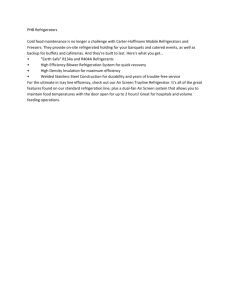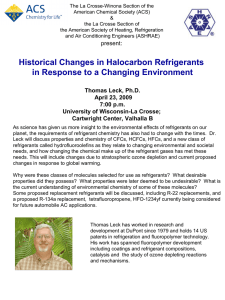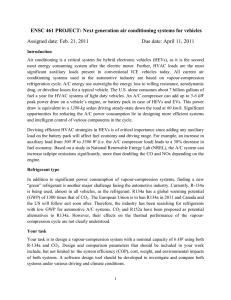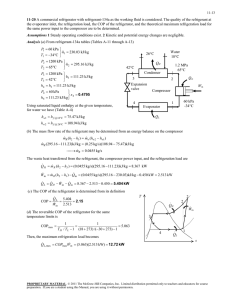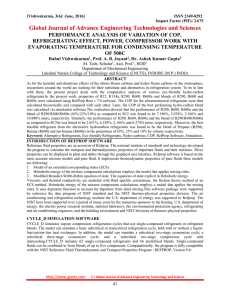IRJET-Experimental Investigation of Performance of VCR System using Refrigerants R134A, R600A, and R290
advertisement
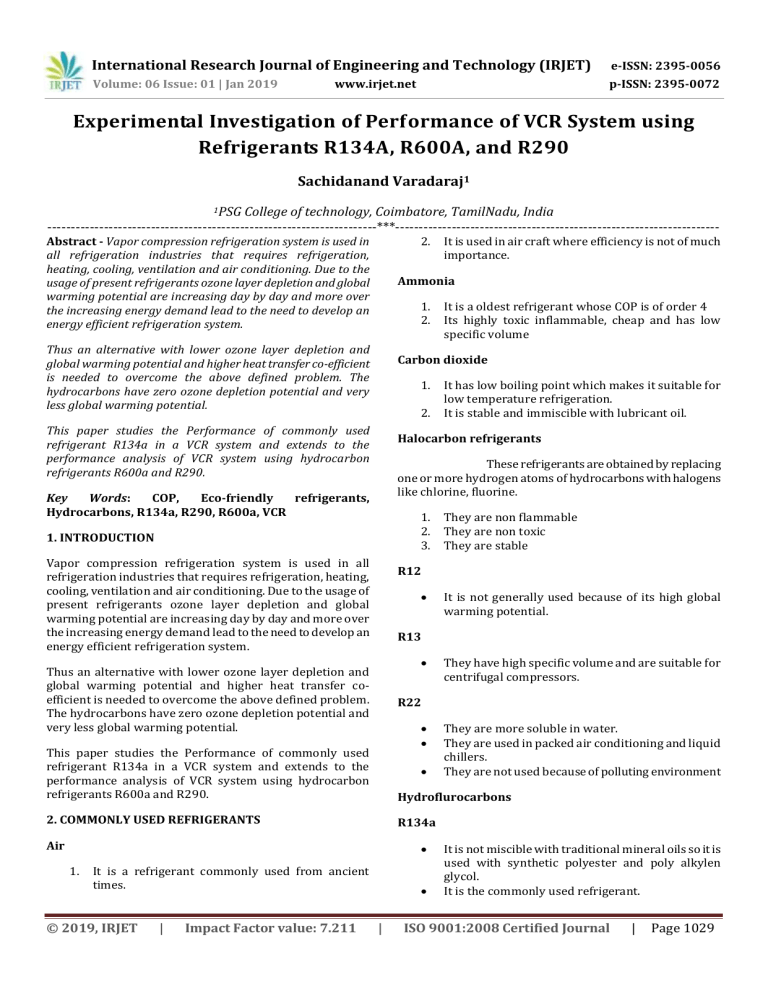
International Research Journal of Engineering and Technology (IRJET) e-ISSN: 2395-0056 Volume: 06 Issue: 01 | Jan 2019 p-ISSN: 2395-0072 www.irjet.net Experimental Investigation of Perf ormance of VCR System using Refrigerants R134A, R600A, and R290 Sachidanand Varadaraj1 1PSG College of technology, Coimbatore, TamilNadu, India ----------------------------------------------------------------------***--------------------------------------------------------------------- Abstract - Vapor compression refrigeration system is used in all refrigeration industries that requires refrigeration, heating, cooling, ventilation and air conditioning. Due to the usage of present refrigerants ozone layer depletion and global warming potential are increasing day by day and more over the increasing energy demand lead to the need to develop an energy efficient refrigeration system. 2. It is used in air craft where efficiency is not of much importance. Ammonia 1. 2. Thus an alternative with lower ozone layer depletion and global warming potential and higher heat transfer co-efficient is needed to overcome the above defined problem. The hydrocarbons have zero ozone depletion potential and very less global warming potential. It is a oldest refrigerant whose COP is of order 4 Its highly toxic inflammable, cheap and has low specific volume Carbon dioxide 1. 2. This paper studies the Performance of commonly used refrigerant R134a in a VCR system and extends to the performance analysis of VCR system using hydrocarbon refrigerants R600a and R290. It has low boiling point which makes it suitable for low temperature refrigeration. It is stable and immiscible with lubricant oil. Halocarbon refrigerants These refrigerants are obtained by replacing one or more hydrogen atoms of hydrocarbons with halogens like chlorine, fluorine. Key Words: COP, Eco-friendly refrigerants, Hydrocarbons, R134a, R290, R600a, VCR 1. 2. 3. 1. INTRODUCTION Vapor compression refrigeration system is used in all refrigeration industries that requires refrigeration, heating, cooling, ventilation and air conditioning. Due to the usage of present refrigerants ozone layer depletion and global warming potential are increasing day by day and more over the increasing energy demand lead to the need to develop an energy efficient refrigeration system. They are non flammable They are non toxic They are stable R12 It is not generally used because of its high global warming potential. R13 Thus an alternative with lower ozone layer depletion and global warming potential and higher heat transfer coefficient is needed to overcome the above defined problem. The hydrocarbons have zero ozone depletion potential and very less global warming potential. They have high specific volume and are suitable for centrifugal compressors. R22 They are more soluble in water. They are used in packed air conditioning and liquid chillers. They are not used because of polluting environment This paper studies the Performance of commonly used refrigerant R134a in a VCR system and extends to the performance analysis of VCR system using hydrocarbon refrigerants R600a and R290. Hydroflurocarbons 2. COMMONLY USED REFRIGERANTS R134a Air 1. It is a refrigerant commonly used from ancient times. © 2019, IRJET | Impact Factor value: 7.211 | It is not miscible with traditional mineral oils so it is used with synthetic polyester and poly alkylen glycol. It is the commonly used refrigerant. ISO 9001:2008 Certified Journal | Page 1029 International Research Journal of Engineering and Technology (IRJET) e-ISSN: 2395-0056 Volume: 06 Issue: 01 | Jan 2019 p-ISSN: 2395-0072 www.irjet.net R152a It has low global warming potential. It is flammable and has low energy consumption. R600a It is an organic compound with large volumetric flow. It provides a safe, quiet and highly efficient system. R290 R22 1810 High EXPERIMENTAL PROCEDURE It consists of hydrogen and carbon atoms and it is a colorless gas and it is most suitable for low temperature applications 0 Experimental analysis of refrigerants such as R134a, R600a, R290 are carried out. It has low efficiency at high condensation temperatures Hydrocarbons 3 4. EXPERIMENTAL ANALYSIS R404a R290 They are compactable with the components and lubricants used in conventional refrigeration system It is highly flammable. Evacuation is done using a rotary vacuum pump by creating vacuum in the experimental setup. Using charging line, charging valve and digital weighing machine optimum amount of the refrigerant is charged. Load the evaporator with desired liters of water and switch on the setup and note down the readings. Note the initial and final energy meter reading and initial and final water temperature. Note the pressure at suction and discharge side of compressor and condenser discharge pressure. Similarly temperature at various location of setup. Then experiment is carried out till the water reaches the maximum negative temperature. Using the formulas discussed below actual and relative COP of the system is calculated. 3. ENVIRONMENTAL ISSUES FORMULAS In addition to being toxic or explosive and thereby dangerous to people's health, there are other problems associated with refrigerants. Environmental aspects are increasingly being taken into consideration. Refrigerants can thus also be ranked according to their impact on the stratospheric ozone layer (the Ozone Depletion Potential, ODP) or as greenhouse gases (the Global Warming Potential, GWP). The actual and relative COP of the refrigerating system is calculated using the below discussed formulas. ACTUAL COP COP = REFRIGERATING EFFECT COMPRESSORWORK RE =[ mcp water(∆TUPTO 0◦)+mhfg+mcp ice(∆TAFTER 0 C)]÷TIME TAKEN IN MINUTES Ozone Depletion Potential, ODP The ODP is the ratio of the impact on ozone of a chemical compared with the impact of a similar mass of CFC-11 (R11). Thus, the ODP of CFC-11 is 1.0 by definition. m Global Warming potential, GWP hfg =latent heat of fusion of ice(KJ/Kg ) The GWP is the ratio of the warming caused by a substance to the warming caused by a similar mass of carbon dioxide. Thus, the GWP of CO2 is 1.0 by definition Cp ice =specific heat of ice(KJ/Kg K) WC =[∆E ×60]/ Time taken in minutes ∆E = difference in energy meter reading(KWh) CPwater =specific heat of water(KJ/Kg K) Table -1: GWP and ODP of various refrigerants REFRIGERANT GWP ODP R134a 1430 Low R600a 3 0 © 2019, IRJET | Impact Factor value: 7.211 = mass of water (Kg) IDEAL COP h1− h3 IDEAL COP = h2− h1 | ISO 9001:2008 Certified Journal | Page 1030 International Research Journal of Engineering and Technology (IRJET) e-ISSN: 2395-0056 Volume: 06 Issue: 01 | Jan 2019 p-ISSN: 2395-0072 www.irjet.net h1=enthalpy at evaporator outlet (KJ/Kg) 2. REFRIGERATION EFFECT = 0.0648 kW h2=enthalpy at compressor outlet (KJ/Kg) 3. COMPRESSOR WORK h3=enthalpy at condenser outlet (KJ/Kg) 4. ACTUAL COP = 0.365 RELATIVE COP 5. IDEAL COP = 0.3864 6. RELATIVE COP = 0.944 RELATIVE COP = ACTUALCOP IDEAL COP The following are the results obtained for refrigerant R600a, 5. DATA COLLECTION Table -2: Data collection of R134a. LOAD TIME(min) (kg) INITIAL FINAL ENERGY READING READING METER 0C 0C READING kW-hr 1 115 26 -2 = 0.177 kW 0.34 1. LOAD = 1 kg 2. REFRIGERATION EFFECT = 0.043 kW 3. COMPRESSOR WORK 4. ACTUAL COP = 0.299 5. IDEAL COP = 1.272 6. RELATIVE COP = 0.2349 = 0.1454 The following are the results obtained for refrigerant R290, Table -3: Data collection of R600a. LOAD TIME(min) (kg) 1 165 1. LOAD = 1 kg INITIAL FINAL ENERGY 2. REFRIGERATION EFFECT = 0.062 kW READING READING METER 3. COMPRESSOR WORK 0C 0C READING 4. ACTUAL COP = 0.255 kW-hr 5. IDEAL COP = 1.25 0.4 6. RELATIVE COP = 0.204 23 0 = 0.243 Table -4: Data collection of R290. LOAD TIME(min) (kg) INITIAL FINAL ENERGY READING READING METER 0C 0C READING kW-hr 1 134 23 0 0.55 6. RESULTS AND DISCUSSION The following are the results obtained for refrigerant R134a, 1. LOAD © 2019, IRJET Chart -1: Graphical representation of COP (coefficient of performance) of refrigerants R134a, R600a, and R290. = 1 kg | Impact Factor value: 7.211 | ISO 9001:2008 Certified Journal | Page 1031 International Research Journal of Engineering and Technology (IRJET) e-ISSN: 2395-0056 Volume: 06 Issue: 01 | Jan 2019 p-ISSN: 2395-0072 www.irjet.net From the above graph it is inferred that Coefficient of performance of R134a is higher than R600a and R290 in a relative measure even though hydrocarbons like R600a and R 290 can be used owing to their low global warming effects. 7. NOMENCLATURE VCR - Vapor compression refrigeration. COP - Coefficient of performance. ACKNOWLEDGEMENT I wish to express my sincere gratitude to our beloved Principal Dr. R. Rudramoorthy and management for providing an opportunity and necessary facilities in carrying out this project work. I deeply express my sincere thanks to Dr. P .R. Thyla, Professor & Head of the department, Mechanical Engineering, PSG College of Technology, Coimbatore for encouraging and allowing me to carry out this project. It is my privilege to express my sincere regards to my project guide, Dr .Punitharani, Assistant Professor, Department of Mechanical Engineering, PSG College of Technology for her valuable inputs, able guidance, encouragement, whole-hearted cooperation and constructive criticism throughout the duration of my project. © 2019, IRJET | Impact Factor value: 7.211 | ISO 9001:2008 Certified Journal | Page 1032
